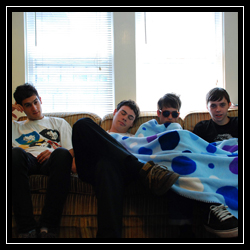
While the band’s musical scholarship is undeniable, one would be wise to avoid pinpointing a particular influence. “A band can make a whole career out of sounding like Radiohead, and no one says anything,” Sambol points out. “But when a band tries to go through someone that’s maybe easier to poke at – the Kinks or Dylan – people desperately want to reference it.” Touché.
While Sambol noted that he one day hopes to outgrow any influences, the band’s official debut full-length, The Strange Boys and Girls Club, already finds the band standing solidly on its own. It’s the sound of high school dances stomped out on gymnasium floors long since abandoned; cold nights and warm whiskey; bad decisions and trouble. The jangling guitars are punctuated with strategic bursts of fuzz; the drums provide a laconic shuffling rhythm that pushes the band along just so without ever rushing things. Sambol’s strained bleat sounds simultaneously desperate and elated.
1 comment:
I always find articles like "Destined" so interesting in terms of how artists become recognized. You mention, for example, that a number of recognized bands have been hailed by Dusted. This seems to bring up a question that music ezines have really forefronted in aesthetic criticism: Does the very mention of a band as "up and coming" lend to its becoming "established?"
Of course, this doesn't downplay the contributions like Dusted's Destined or Pitchfork's Best New Music or Tinymixtapes Eureka, but I wonder how the bands/artists would have fared without the feature. On a larger scope, just how much does society/culture/fashion have to do with what artists are 'good?'
Thanks for the post, and a great song.
Post a Comment